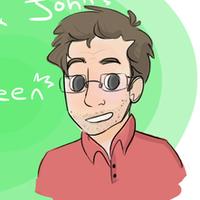11. The Extraordinary Story of Hussam: Teenager, Writer, and Syrian Refugee.
Good morning, Hank. It's Tuesday. So on the day I met Aida and Majeeda at the Azraq Refugee Camp in Northern Jordan, I also met sixteen-year-old Husam.
"Hi John, how are you?" "Good, nice to meet you." "Yeah, nice to meet you too." Husam is a truly extraordinary kid who lives with his mother and younger brother in a shelter with very little furniture, except a bookshelf, which contains the Quran and a couple other books. I began by asking Husam how he learned to speak English.
"Actually, I learned here in the camp." "You learned in the camp?" "Yeah, three months of hard study." "Three months?" "I download some videos from YouTube and I learnt speaking, listening." That's right, he learned from YouTube. Well, and he works with a tutor, who's also a Syrian refugee. "I go to him every day, every day. Nightly, in the morning, when I have free time, I just go up to him and say, 'Hey, teach me English.' He has two accents, American and Britain." [Laughter]
Lizziana and I are laughing because for both of us, that's one more accent than we have. Husam also studied English a little bit back in Syria. In fact, he was in English class when his school was bombed.
"Suddenly, we heard the English teacher shouting, 'Lay down!' And all the students were laying on the ground. So, just- An airplane shelled the school with missiles. And many students, my friends, died and were injured. The girls were crying, and I had my friend who died. [Unknown speech] His name, and actually, it was terrible. Yeah. It was terrible." "So..." "And I can see that you think about your friend often." "Yeah, actually, I will show you his photos and the school." "Yeah, can you show me?" This happened to me often in Jordan. The refugees I met almost never had printed photographs. Instead, their pictures of friends and family were on phones; sometimes on nonfunctioning phones they kept charged only to access the pictures.
Husam first showed me a picture of blood in the floor of his classroom. And then he showed me his only picture of his friend. It was of a teen boy's corpse, his dead eyes staring up at the camera. I asked him if this is why his family had left Syria.
"Yeah, this moment. They said, 'No school. No working. No life.' Syria wasn't safe, so we should go to Jordan to receive a better life." But since then, Husam's family has spread out. "I have three parts of my family. One in Syria, one in Germany, and we are here, and actually I have my brother in Turkey." His brother in Turkey is on scholarship at university. He has two married sisters still in Syria, and his father, an engineer, and older brother took the boats to cross into Europe more than a year ago.
Husam, his mother, and younger brother, are hoping to be allowed to reunite with them soon in Germany.
Husam seems to genuinely love learning. He's a very successful tenth grader at the refugee camp's high school. He also loves writing stories.
"I like to write adventure stories. So, somebody who's lost in the forest, and he's found something in the night, and things like that I can write. So I like it." But when I asked him if he wanted to be a writer or a translator when he grew up, he said no.
"I hope to be into engineering, like my father, who's in Germany. To finish my studies. When I finish, I go to a company in Syria, which helps Syrian-People in Syria." "And to help rebuild it, that would be your dream?" "Yeah, rebuild it. This is my dream, actually. Syria, it's my country. It's the green country. I love it so much." This young man has not seen his father, his sisters, or two of his brothers in more than a year, and he knows that they can only be reunited in a safe, peaceful Syria. And that is his dream. To rebuild that country.
Husam also loves to sing. In fact, he sang to us about Syria while his mother wept.
[Singing]
And so this young singer and writer will hopefully one day soon be a engineer. And I really admire that professional goal. Husam is a brilliant and tremendously disciplined kid. I mean, he learned English in three months. He could do anything. But his greatest ambition is to bring his talents to the kind of work his country will need the most. And to me, that' true heroism. Godspeed Husam. May your dreams come true. May you be a soldier in the army of engineers that rebuilds our country.
Hank, I'll see you on Friday. [Singing]

